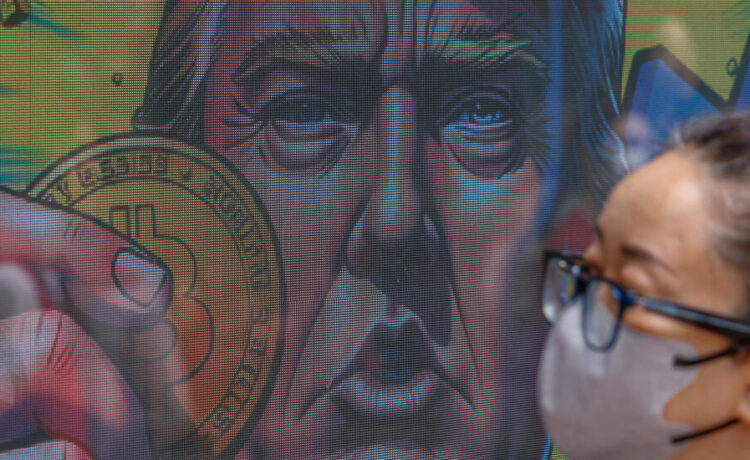Few people own cryptocurrencies. You have to create a digital wallet. Your bank might not offer them as investments. In recent years, the government has treated this new form of money, which can be transferred instantly with little oversight, as a risky asset. Because most digital coins have no inherent value — they are worth only what people will pay for them — speculators drive the price up and down quickly.
So when crypto crashed three years ago, the fallout didn’t wreck the whole economy. The price of Bitcoin and other digital currencies plummeted. Several companies entered bankruptcy. Top executives went to prison. Analysts called it crypto’s Great Recession. But while crypto traders lost a lot of money, ordinary people barely noticed.
President Trump could change that. He’s a fan of this relatively new form of digital money. He promotes digital coins to his followers (and profits when they purchase them). He promises to create a federal stash of Bitcoin and enable companies to offer more coins to the public. The result is that, in the coming years, many more Americans will likely own crypto, exposing them to its perils.
Next time the industry crashes, analysts fear, the impact could be more severe, rippling across the economy and hurting a wider array of investors. In today’s newsletter, I’ll explain three ways that Trump is deepening crypto’s connection to mainstream finance.
Trump coins
The riskiest type of crypto may be the memecoin, a digital currency based on an online joke or a celebrity mascot. It has no practical use, and vendors won’t accept it as a form of payment.
Three days before his inauguration, Trump created his own memecoin, calling it $Trump. He advertised it on his social media accounts. Crypto investors snapped up $Trump coins, causing the price to skyrocket. The Trump family collected millions of dollars in fees. In effect, Trump had put a presidential seal of approval on speculation — and profited from it.
The surge didn’t last long. The coin’s price dropped 60 percent overnight, and hundreds of thousands of people lost money. Who suffered? An analysis by a crypto forensics firm found that most of the coin’s buyers were probably first-time investors in digital currencies.
Less oversight
The Biden administration spent years cracking down on crypto. The Securities and Exchange Commission filed a series of lawsuits arguing that digital currencies should be subject to the same strict rules that govern stocks and bonds on Wall Street.
The aim was to protect consumers. For years, crypto scammers have marketed coins to the public, raked in money and then fled before prices fell, leaving ordinary investors with big losses.
Trump promises to end the government’s “war on crypto.” Industry executives want legislation that would strip authority from the S.E.C. and transfer oversight of digital currencies to a smaller, less aggressive agency, the Commodity Futures Trading Commission.
That would have two likely effects. First, it would signal to scammers that they won’t be policed as closely. They could then create more risky coins and market them aggressively to unsuspecting investors.
Second, it might pave the way for legitimate banks and investment firms to offer more products tied to crypto. Right now, you have to set up a complicated digital wallet and learn a new financial system to buy most cryptocurrencies. Some Wall Street firms think it should be easier. They want to create special investment funds that contain crypto and then sell you shares. You could buy the shares — even keep them in your retirement account or your kid’s college savings fund — just like ordinary stocks.
Several companies already offer this type of product tied to Bitcoin. (When Bitcoin’s price falls, the value of the shares falls, too.) The S.E.C. has discouraged financial firms from doing the same with other cryptocurrencies, arguing that it would expose ordinary investors to the risks of a market crash.
Trump’s allies hope all that is about to change.
A national Bitcoin stockpile
In a speech in Nashville last summer, Trump promised to create a “national Bitcoin stockpile.” It’s not entirely clear what he meant. But influential crypto executives want the new administration to hold Bitcoin the way it holds oil and gold, in “strategic reserve.” They argue that, as Bitcoin rises, the investment will help erode the $36 trillion national debt and ensure U.S. dominance if the global economy someday runs on cryptocurrencies. Last month, Trump asked a task force to study the possibility.
But if the Treasury held Bitcoin, the next crash wouldn’t just clean out a few day traders. It might upend the nation’s finances.
THE LATEST NEWS
Trump Administration
Kendrick Lamar was the first rapper to headline the N.F.L.’s Super Bowl halftime show solo. He made his diss track about Drake, “Not Like Us,” the centerpiece of his set at the expense of a larger statement, Jon Caramanica writes.
“It was quite a spectacle — perhaps the peak of any rap battle, ever.” Read more about the performance, which included an appearance from Serena Williams.

















